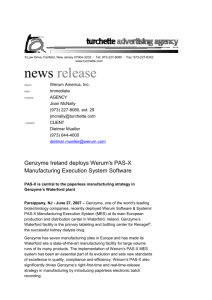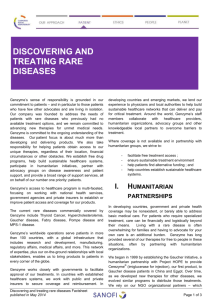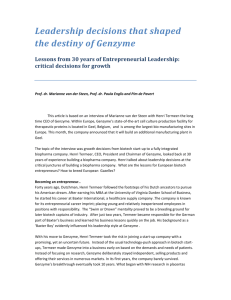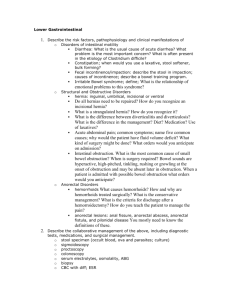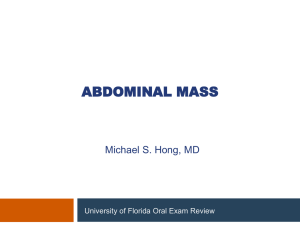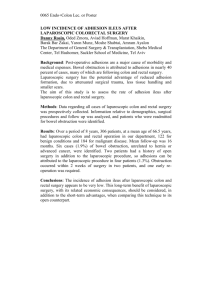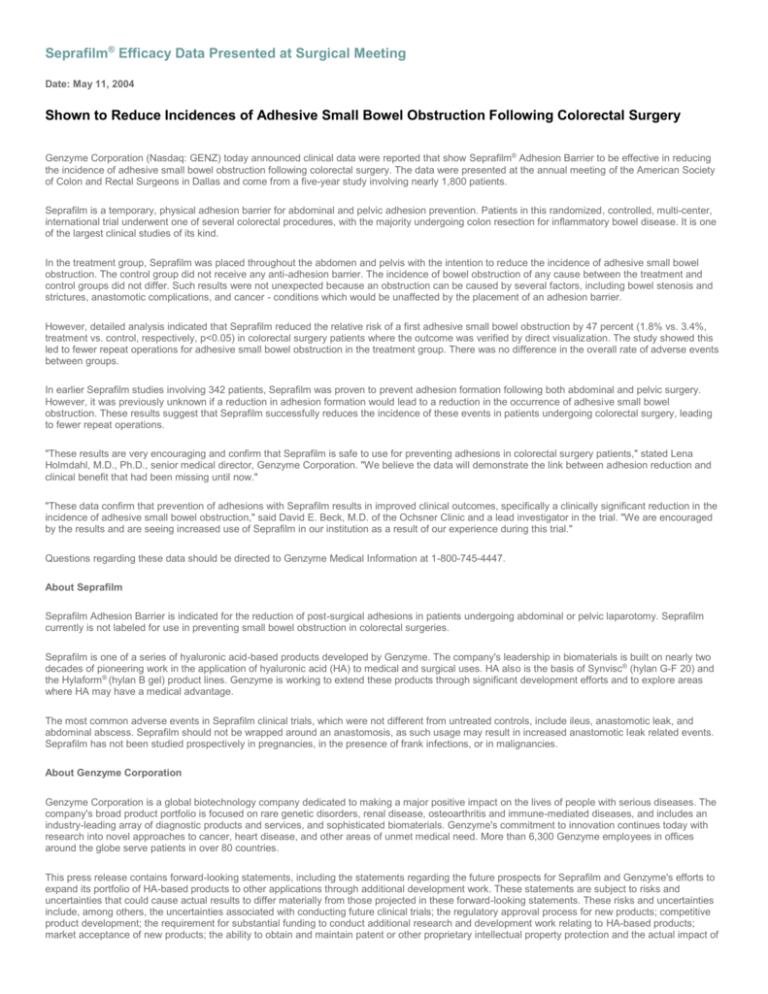
Seprafilm® Efficacy Data Presented at Surgical Meeting
Date: May 11, 2004
Shown to Reduce Incidences of Adhesive Small Bowel Obstruction Following Colorectal Surgery
Genzyme Corporation (Nasdaq: GENZ) today announced clinical data were reported that show Seprafilm® Adhesion Barrier to be effective in reducing
the incidence of adhesive small bowel obstruction following colorectal surgery. The data were presented at the annual meeting of the American Society
of Colon and Rectal Surgeons in Dallas and come from a five-year study involving nearly 1,800 patients.
Seprafilm is a temporary, physical adhesion barrier for abdominal and pelvic adhesion prevention. Patients in this randomized, controlled, multi-center,
international trial underwent one of several colorectal procedures, with the majority undergoing colon resection for inflammatory bowel disease. It is one
of the largest clinical studies of its kind.
In the treatment group, Seprafilm was placed throughout the abdomen and pelvis with the intention to reduce the incidence of adhesive small bowel
obstruction. The control group did not receive any anti-adhesion barrier. The incidence of bowel obstruction of any cause between the treatment and
control groups did not differ. Such results were not unexpected because an obstruction can be caused by several factors, including bowel stenosis and
strictures, anastomotic complications, and cancer - conditions which would be unaffected by the placement of an adhesion barrier.
However, detailed analysis indicated that Seprafilm reduced the relative risk of a first adhesive small bowel obstruction by 47 percent (1.8% vs. 3.4%,
treatment vs. control, respectively, p<0.05) in colorectal surgery patients where the outcome was verified by direct visualization. The study showed this
led to fewer repeat operations for adhesive small bowel obstruction in the treatment group. There was no difference in the overall rate of adverse events
between groups.
In earlier Seprafilm studies involving 342 patients, Seprafilm was proven to prevent adhesion formation following both abdominal and pelvic surgery.
However, it was previously unknown if a reduction in adhesion formation would lead to a reduction in the occurrence of adhesive small bowel
obstruction. These results suggest that Seprafilm successfully reduces the incidence of these events in patients undergoing colorectal surgery, leading
to fewer repeat operations.
"These results are very encouraging and confirm that Seprafilm is safe to use for preventing adhesions in colorectal surgery patients," stated Lena
Holmdahl, M.D., Ph.D., senior medical director, Genzyme Corporation. "We believe the data will demonstrate the link between adhesion reduction and
clinical benefit that had been missing until now."
"These data confirm that prevention of adhesions with Seprafilm results in improved clinical outcomes, specifically a clinically significant reduction in the
incidence of adhesive small bowel obstruction," said David E. Beck, M.D. of the Ochsner Clinic and a lead investigator in the trial. "We are encouraged
by the results and are seeing increased use of Seprafilm in our institution as a result of our experience during this trial."
Questions regarding these data should be directed to Genzyme Medical Information at 1-800-745-4447.
About Seprafilm
Seprafilm Adhesion Barrier is indicated for the reduction of post-surgical adhesions in patients undergoing abdominal or pelvic laparotomy. Seprafilm
currently is not labeled for use in preventing small bowel obstruction in colorectal surgeries.
Seprafilm is one of a series of hyaluronic acid-based products developed by Genzyme. The company's leadership in biomaterials is built on nearly two
decades of pioneering work in the application of hyaluronic acid (HA) to medical and surgical uses. HA also is the basis of Synvisc® (hylan G-F 20) and
the Hylaform® (hylan B gel) product lines. Genzyme is working to extend these products through significant development efforts and to explore areas
where HA may have a medical advantage.
The most common adverse events in Seprafilm clinical trials, which were not different from untreated controls, include ileus, anastomotic leak, and
abdominal abscess. Seprafilm should not be wrapped around an anastomosis, as such usage may result in increased anastomotic leak related events.
Seprafilm has not been studied prospectively in pregnancies, in the presence of frank infections, or in malignancies.
About Genzyme Corporation
Genzyme Corporation is a global biotechnology company dedicated to making a major positive impact on the lives of people with serious diseases. The
company's broad product portfolio is focused on rare genetic disorders, renal disease, osteoarthritis and immune-mediated diseases, and includes an
industry-leading array of diagnostic products and services, and sophisticated biomaterials. Genzyme's commitment to innovation continues today with
research into novel approaches to cancer, heart disease, and other areas of unmet medical need. More than 6,300 Genzyme employees in offices
around the globe serve patients in over 80 countries.
This press release contains forward-looking statements, including the statements regarding the future prospects for Seprafilm and Genzyme's efforts to
expand its portfolio of HA-based products to other applications through additional development work. These statements are subject to risks and
uncertainties that could cause actual results to differ materially from those projected in these forward-looking statements. These risks and uncertainties
include, among others, the uncertainties associated with conducting future clinical trials; the regulatory approval process for new products; competitive
product development; the requirement for substantial funding to conduct additional research and development work relating to HA-based products;
market acceptance of new products; the ability to obtain and maintain patent or other proprietary intellectual property protection and the actual impact of
those patents and rights; and the risks and uncertainties described in reports filed by Genzyme with the Securities and Exchange Commission under the
Securities Exchange Act of 1934, as amended, including without limitation the information under the heading "Factors Affecting Future Operating
Results" in the Management's Discussion and Analysis of Financial Condition and Results of Operations section of the Genzyme Annual Report on Form
10-Q for the quarter ending March 31, 2004. Genzyme cautions investors not to place undue reliance on the forward-looking statements contained in
this press release. These statements speak only as of the date of this press release, and Genzyme undertakes no obligation to update or revise the
statements.
Genzyme®, Seprafilm®, Hylaform® and Synvisc® are registered trademarks of Genzyme Corporation. All rights reserved.


